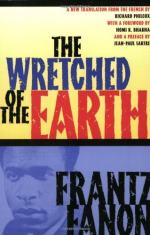
|
| Name: _________________________ | Period: ___________________ |
This test consists of 5 multiple choice questions, 5 short answer questions, and 10 short essay questions.
Multiple Choice Questions
1. In what country did Belgian colonialist military forces remove rural youths from the cities in 1957?
(a) New Zealand
(b) India
(c) Iraq
(d) Congo
2. Wise rebel leaders recognize the importance of what?
(a) Education
(b) Peace
(c) Retreat
(d) Compromise
3. Where is the most spontaneous and explosive force for the revolution found?
(a) The colonialists' mansions
(b) The government buildings
(c) The ghetto fringes of the cities
(d) The colonial nation
4. Why do local chiefs and tribal potentates side with the colonialists?
(a) Loyalty
(b) Personal interests
(c) Fear of the colonialists
(d) Economic interest
5. What does Fanon call the rural people?
(a) Urbanites
(b) Bourgeoisie
(c) Intellectual elite
(d) Lumpenproletariat
Short Answer Questions
1. The indigenous people value what according to Fanon?
2. In indulging in the "fraternal bloodbath," the native distracts itself from confronting what?
3. How do the rural peasants feel about being bypassed at first?
4. Who was the colonial power in Angola?
5. What will the initial period of euphoria be replaced with?
Short Essay Questions
1. Why do the rebel leaders flee to the countryside? What happens to the movement?
2. What are the earliest stages of the rebellion like?
3. Why is the colonizing nation not interested in violence against the native peoples?
4. Why do the colonial powers seek to create a divide between the rural and urban areas?
5. Why is educating and indoctrinating the groups that have joined the rebellion important?
6. How do the colonial powers try to combat the revolution?
7. What is the biggest mistake that rebel political movements make in underdeveloped countries? Why?
8. Why are the lumpenproletariat so important for the revolutionary movement?
9. How is the colonialist bourgeoisie aided by religion?
10. What situations or obstacles may threaten the movement? Why?
|
This section contains 849 words (approx. 3 pages at 300 words per page) |

|




